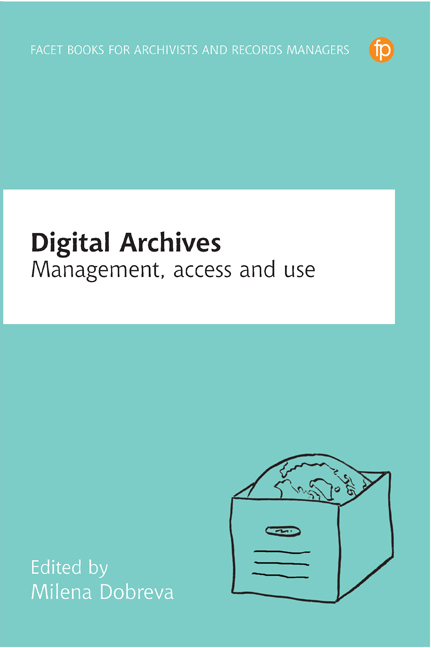Book contents
- Frontmatter
- Dedication
- Contents
- List of Figures and Tables
- Abbreviations
- Foreword
- Preface: Digital archives: management, use and access participatory approaches in archives
- Acknowledgements
- Notes on contributors
- PART I DRIVERS FOR MODERN DIGITAL ARCHIVES
- PART II CASE STUDIES
- 7 Research data archives: current data management and data audit practices
- 8 Access restrictions
- 9 Citizen science: two case studies in oral history research
- Afterword
- Index
9 - Citizen science: two case studies in oral history research
from PART II - CASE STUDIES
Published online by Cambridge University Press: 02 October 2019
- Frontmatter
- Dedication
- Contents
- List of Figures and Tables
- Abbreviations
- Foreword
- Preface: Digital archives: management, use and access participatory approaches in archives
- Acknowledgements
- Notes on contributors
- PART I DRIVERS FOR MODERN DIGITAL ARCHIVES
- PART II CASE STUDIES
- 7 Research data archives: current data management and data audit practices
- 8 Access restrictions
- 9 Citizen science: two case studies in oral history research
- Afterword
- Index
Summary
Introduction
There have been many participatory approaches to digital cultural heritage in recent years, with a groundbreaking work on archives by Sexton and Flinn (2013). There is particularly prominent interest in the applications of crowd sourcing (Ridge, 2014) and citizen science in this domain (Dobreva, 2016). One area where participatory approaches could be particularly beneficial is oral history research; the advantage of appealing to the wisdom of the crowd is to attract greater numbers of contributors to the collection of histories on a particular topic. Involving a wider network of informants should ideally allow more content collecting and refining of information through the memories of participants.
Oral history projects can follow different designs and one recent trend is to involve interviewers as voluntary contributors after providing sufficient context on the research and interview process. Volunteers can also help in transcribing and curating interviews. In some cases, people from the same community or even family may be involved since they have the advantage of knowing the interviewee, which can be beneficial for topics where there are no areas of sensitivity. In other cases, spreading the word in the community can help to identify potential contributors to the project.
This chapter explores two case studies on oral history projects implemented in two countries (Ireland and Malta) and on different topics (rural place names and tattoo art history). In Ireland, six teenagers aged 15 or 16, from two schools, applied to take part in the project within three weeks in November 2014. In Malta, university students were involved in the various stages of the project, from holding and transcribing interviews to populating digital content on an institutional repository.
Looking at two case studies helps us to better understand the dynamic of early involvement of volunteers and to explore the potential benefits for projects that require a high level of dedication.
Participatory approaches in archives
Staff in memory institutions are interested in involving members of the general public in contributing to the creation and/or refinement of digital content. One of the popular ways of engaging citizens is crowd sourcing; in 2011 Johan Oomen and Lora Aroyo proposed a typology, which looks at several ways of engaging citizens: through correction and transcription, contextualisation, complementing collections, classification, co-curation and crowdfunding (Oomen and Aroyo, 2011).
- Type
- Chapter
- Information
- Digital ArchivesManagement, use and access, pp. 167 - 176Publisher: FacetPrint publication year: 2018



